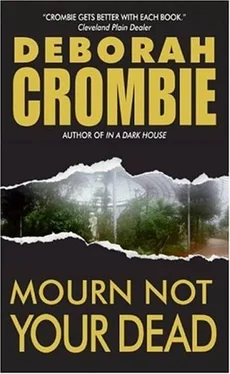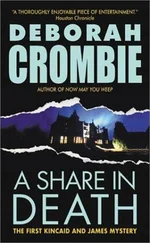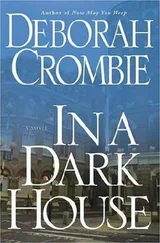Deborah Crombie - Mourn Not Your Dead
Здесь есть возможность читать онлайн «Deborah Crombie - Mourn Not Your Dead» весь текст электронной книги совершенно бесплатно (целиком полную версию без сокращений). В некоторых случаях можно слушать аудио, скачать через торрент в формате fb2 и присутствует краткое содержание. Жанр: Детектив, на английском языке. Описание произведения, (предисловие) а так же отзывы посетителей доступны на портале библиотеки ЛибКат.
- Название:Mourn Not Your Dead
- Автор:
- Жанр:
- Год:неизвестен
- ISBN:нет данных
- Рейтинг книги:4 / 5. Голосов: 1
-
Избранное:Добавить в избранное
- Отзывы:
-
Ваша оценка:
- 80
- 1
- 2
- 3
- 4
- 5
Mourn Not Your Dead: краткое содержание, описание и аннотация
Предлагаем к чтению аннотацию, описание, краткое содержание или предисловие (зависит от того, что написал сам автор книги «Mourn Not Your Dead»). Если вы не нашли необходимую информацию о книге — напишите в комментариях, мы постараемся отыскать её.
Mourn Not Your Dead — читать онлайн бесплатно полную книгу (весь текст) целиком
Ниже представлен текст книги, разбитый по страницам. Система сохранения места последней прочитанной страницы, позволяет с удобством читать онлайн бесплатно книгу «Mourn Not Your Dead», без необходимости каждый раз заново искать на чём Вы остановились. Поставьте закладку, и сможете в любой момент перейти на страницу, на которой закончили чтение.
Интервал:
Закладка:
Enlightened, he said, “Oh, I see. She’s quite the entrepreneur, isn’t she?”
The girl looked at him blankly for a moment, as if he’d exceeded her vocabulary, then directed, “Just go round the side and ring the bell.”
Kincaid leaned a little more determinedly on the counter and ventured, “You’d be about school-leaving age, I should think?”
She blushed to the roots of her fair hair and whispered, “I did my GCSE’s last year, sir.”
“Do you know Lucy Penmaric at all, then?”
Seeming to find this question less intimidating, she answered a bit louder. “I know her to speak to, of course, but we don’t hang about together, if that’s what you mean. She’s never had much to do with the village kids.”
“Stuck-up, is she?” Kincaid asked, inviting a confidence. Deveney, flipping idly through the postcards while munching his apple, gave every appearance of ignoring their conversation.
Frowning, the girl pushed her hair from her face. “No, I wouldn’t say that. Lucy’s always nice enough, she just doesn’t seem to mix with anyone.”
“That’s too bad, considering what’s happened,” said Kincaid. “I imagine she could use a friend just now.”
“Oh, aye,” she said. With the first hint of curiosity she’d shown, she added, “You’ll be from the police, then?”
“That we are, love.” Deveney joined them, holding aloft his apple core. “And you’ll be doing us a great service if you’ll toss this in the bin.” He winked at her, and she blushed again but took the apple core willingly enough.
Cocky bastard, thought Kincaid. He thanked the girl and she smiled at him gratefully. As he reached the door, he turned back to her. “What’s your name, by the way?”
She offered it to him on a whispered breath. “Sarah.”
“That one’s not likely to make a rocket scientist,” quipped Deveney as they left the shop.
“I’d say she’s shy, not stupid.” Kincaid avoided a puddle as they rounded the corner of the shop. “And I find it dangerous to underestimate people, though I dare say I’ve done it more than once.” He thought again of Vic, of the times she’d come home in a temper, threatening to darken her hair to brunette so that she wouldn’t have to prove her intelligence to everyone she met. It occurred to him now that even though he’d sympathized with her, he’d been just as guilty as the clods he’d criticized-he hadn’t taken her seriously until it had been much too late.
“Touché.” Deveney winced at the mild reproof. “I’ll try to keep a more open mind.”
The side door proved to be at the top of an exterior staircase. It looked to Kincaid as though the stair had been added fairly recently, perhaps in the process of converting the lower floor of the house into a shop. Both railing and door were painted a glossy white. As he pushed the bell, he murmured, “She must be a good witch-she’s got her colors right.”
The door opened as the last words left his lips. Looking at them inquiringly, Madeleine Wade said, “Yes?” and Kincaid, tongue-tied, flushed as painfully as Sarah. While Deveney stumbled through the introductions, Kincaid examined the woman’s clothes, a moss green and rose silk blouse with matching green silk trousers. Her hair was a stylish chin-length bob of a platinum shade he suspected owed more to art than nature. He looked everywhere except at her face until he had his own under control, for Madeleine Wade had an enormous hooked beak of a nose, resembling nothing so much as a caricature of a fairy-tale witch.
She smiled at them as if aware of their discomfort. “Come in, please,” she said as she motioned them into the sitting room. Her voice was deep, almost masculine in timbre, but pleasant. “Sit down and I’ll fix you something to drink. I’m afraid I don’t use any caffeinated products, so you’ll have to settle for herbal tea,” she continued as she moved to the small kitchen adjacent to the sitting room. Although he couldn’t see her face, Kincaid fancied he heard a trace of amusement in her voice.
He and Deveney chorused, “Fine,” then Deveney gave a quick grimace of disgust.
Under his breath, Kincaid said wickedly, “Broaden your horizons, man. It’ll do you good,” then looked around the room with interest. He became aware of music playing faintly but was unable to localize the source. At least he supposed you would call it music, for it consisted of tinkling sounds repeated in rhythmic patterns, like wind chimes moving to mathematical variations.
The flat had a comfortable and rather whimsical charm, with only the massage table on the far side of the sitting room indicating Madeleine Wade’s use of the room for her business. A brightly patterned sheet draped the table, softening its clinical aspect, and the pine bureau on the far wall displayed a collection of plush animals as well as an assortment of oils, lotions, and a pile of fluffy towels.
Kincaid moved to the end of the room, where two deep window embrasures overlooked the shop front. He smiled as he looked at the curtains, made of the same fabric that covered the sofa and massage table. Primitively drawn farmyard animals cavorted across a cheerful white-and-red polka-dotted background, and he found the combination both odd and intriguing. A closer inspection revealed that the red dots were irregular in shape, as if they’d been finger-painted on, and the dogs and sheep in particular looked almost like the animals he’d seen in reproductions of cave paintings.
The left windowsill held a multishaped and-sized variety of corked glass bottles, filled with liquids in hues ranging from the palest green-gold to rich amber. Sprigs of herbs floated in some, and all sported rakish raffia ties.
The other sill held a red geranium in a terra-cotta pot and a marmalade cat curled on a cushion in the sun. When Kincaid gently rubbed a geranium leaf between his fingers, releasing the pungent, spicy scent, the cat stirred but didn’t open its eyes. “Is your cat always so oblivious?” Kincaid asked as a rattle of crockery told him that Madeleine Wade had returned.
“I don’t think the apocalypse would faze Ginger, good-for-nothing beastie that he is. I keep him because the sight of him relaxes the clients.” Placing a tray bearing mugs and an earthenware pot on a low table before the sofa, she sat down and unhurriedly began to pour.
Kincaid watched from near the window as she concentrated on her task. All her movements were graceful and economic, and he found the contrast between her face and her self-assured poise oddly disconcerting. “And the music?” he asked. “Does that serve the same purpose?”
She sat back with her mug. “Do you like it? It’s structured to encourage the brain to emit alpha waves-at least that’s the theory, but it’s called angel music, and I think I prefer the more imaginative description.”
Having taken his seat in one of the simple farmhouse chairs beside the sofa, Deveney lifted his cup, sniffed, and sipped tentatively. “What is this?” he asked, looking pleasantly surprised.
Madeleine Wade chuckled. “Apple cinnamon. I find it a good choice for the uninitiated-familiar and nonthreatening.” She turned to Kincaid, who had sat down opposite Deveney. “And now what can I help you with, Superintendent? I’m assuming you’re here about Alastair Gilbert’s death?”
Kincaid took his mug from the tray and breathed the steam rising from its surface. “We understand you reported a burglary some weeks ago, Miss Wade. Could you tell us about the circumstances?”
“Ah, the burglar-as-murderer theory, is it?” She smiled, showing teeth that were not well shaped but looked as though they had been cared for expensively. “That’s been the most popular hypothesis around the village-a vagrant, thinking the house empty, seizes the opportunity to pilfer it, then when caught red-handed by the commander, panics and kills him. That’s all very convenient for everybody concerned, Superintendent, but I can see at least one logical flaw. My ‘burglary,’ if you want to call it that, for I never found any sign of a break-in, occurred almost three months ago. If any vagrant had been hanging about the village for that length of time, someone would have seen him.”
Читать дальшеИнтервал:
Закладка:
Похожие книги на «Mourn Not Your Dead»
Представляем Вашему вниманию похожие книги на «Mourn Not Your Dead» списком для выбора. Мы отобрали схожую по названию и смыслу литературу в надежде предоставить читателям больше вариантов отыскать новые, интересные, ещё непрочитанные произведения.
Обсуждение, отзывы о книге «Mourn Not Your Dead» и просто собственные мнения читателей. Оставьте ваши комментарии, напишите, что Вы думаете о произведении, его смысле или главных героях. Укажите что конкретно понравилось, а что нет, и почему Вы так считаете.












